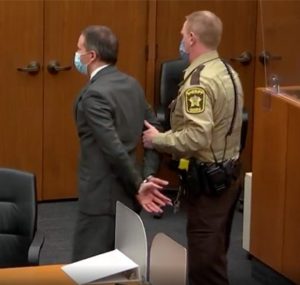If you think the U.S. legal system’s primary objective is justice, you’re wrong; it’s settling disputes. When people disagree, it’s essential to resolve the dispute, one way or another, so the parties and society can move on.
Everyone working in our legal system — judges, lawyers, etc. — know it’s imperfect. Bar association committees debate how to make it better. Courts have ruled that defendants aren’t entitled to perfect trials, only fair ones. Imperfections that don’t affect the outcome are brushed aside by appellate courts. There are procedures to shield juries from publicity and public outcry, but sometimes there isn’t a rock large enough to hide them under.
 In a high-profile, intense media coverage trial like this one, some will wonder whether a fair trial — either way — was even possible. The jurors surely knew an acquittal was likely to trigger civil disobedience, unrest, even violence; wouldn’t be accepted by a large swath of the public; and could turn them into pariahs. Under those circumstances, did the defense ever have a chance?
In a high-profile, intense media coverage trial like this one, some will wonder whether a fair trial — either way — was even possible. The jurors surely knew an acquittal was likely to trigger civil disobedience, unrest, even violence; wouldn’t be accepted by a large swath of the public; and could turn them into pariahs. Under those circumstances, did the defense ever have a chance?
But a criminal trial is not a game of chance; Chauvin’s actions convicted him. The video of his actions merely transmitted the fact of his guilt to the jury — and the watching world.
There’s nothing innocent about pressing a knee on someone’s neck until they’re dead. Chauvin, whatever he is, isn’t a victim of a legal system run amok, or of undue influence on jurors.
Oh sure, we’ll tell ourselves that he needed, and got, a fair trial, We have to do that, to accept the verdict as legitimate, even if we don’t really believe it. Of course, many of us will believe it, whether it’s true or not.
But that’s not the real importance of the verdict. This is: Chauvin’s taking of George Floyd’s life was an issue between him and Floyd’s family and supporters that needed to be resolved. His assault on our common sense of humanity, and our horror at what was done by an officer of the law in our name, is an issue between us and him that has to be resolved. These matters could not be left dangling. If our legal system doesn’t put them to rest, they will be settled in the streets, in a far less orderly manner.
Years ago I read about an ancient Polynesian tribe that didn’t have a legal system, but did have an annual feast day that included a human sacrifice, who was elected by the villagers. You can see where this is going. This crude system, by encouraging acceptable social behavior, and ridding the tribe of those who behaved badly, served its purpose. It didn’t have to be perfectly fair, it only had to work.
Chauvin didn’t invent police brutality against black people. He’s only the latest in a long line of practitioners. When a large swath of society’s patience with that finally ran out, and a human sacrifice was needed, he was elected. He’ll serve.
Photo: Chauvin being led from the courtroom in cuffs after being found guilty of murdering George Floyd
This is round one. There are issues in the trial I am sure the defense attorneys are going to bring up. It is a Minnesota trial, and I’m surprised a jury in any state can convict a defendant on murder and manslaughter with only one victim. Makes one wonder what the jury instructions were. Now the judge could remedy the situation by declaring a mistrial or by tossing one or more charges out prior to sentencing. I rather expect that the Defense will bring it up so they can use it in their appeal and it won’t change the current outcome. Next comes appeals, and the Defendant may have a good day or two with the appeals and in a few years there will be a new trial. Possible not in Minneapolis, but enough time may have passed that a fairer trial could take place in Minneapolis. Of course the Defense team could go for an appeal before sentencing. That would be a surprise move. [This comment has been edited.]
This is what amateur armchair lawyering looks like and illustrates why a legal education and license are required to represent real-life clients. For a better-informed analysis of what might happen on appeal go here.